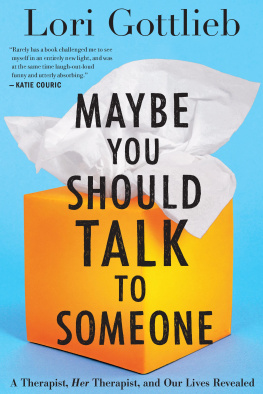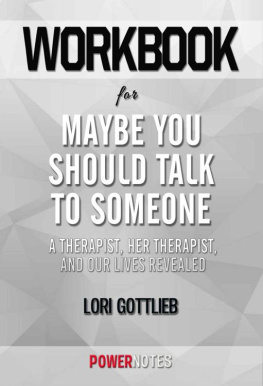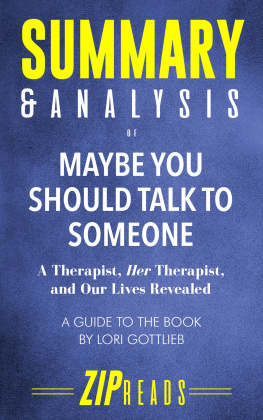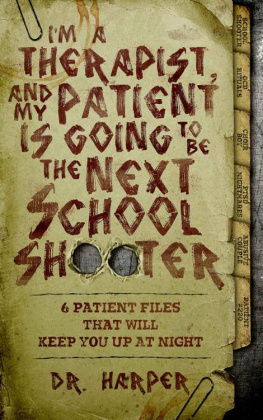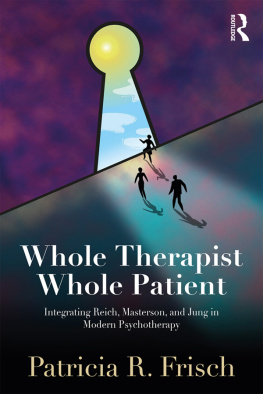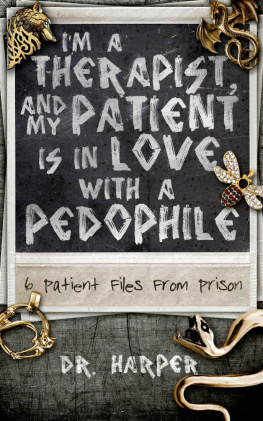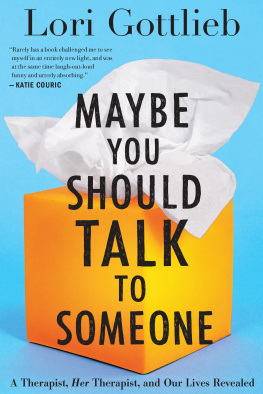Copyright 2019 by Lori Gottlieb
All rights reserved
For information about permission to reproduce selections from this book, write to or to Permissions, Houghton Mifflin Harcourt Publishing Company, 3 Park Avenue, 19th Floor, New York, New York 10016.
hmhbooks.com
Library of Congress Cataloging-in-Publication Data
Names: Gottlieb, Lori, author.
Title: Maybe you should talk to someone : a therapist, HER therapist, and our lives revealed / Lori Gottlieb.
Description: Boston : Houghton Mifflin Harcourt, 2019.
Identifiers: LCCN 2018042562 (print) | LCCN 2018045914 (ebook) | ISBN 9781328663047 (ebook) | ISBN 9781328662057 (hardback)
Subjects: LCSH : Gottlieb, Lori,Health. | PsychotherapistsBiography. | Therapist and patientBiography. | BISAC: PSYCHOLOGY / Psychotherapy / General. | BIOGRAPHY & AUTOBIOGRAPHY / Personal Memoirs. | SELF-HELP / Personal Growth / Happiness. | FAMILY & RELATIONSHIPS /Love & Romance. Classification: LCC RC 480.8 (ebook) |
LCC RC 480.8 . G 68 2019 (print) | DDC 616.89/14092 [B] dc23
LC record available at https://lccn.loc.gov/2018042562
Cover design by Martha Kennedy
Hand lettering Gill Heeley
Cover photograph hatman12 / iStock / Getty Images Plus
Author photograph Shlomit Levy Bard
v1.0319
Illustrations on , from left to right: Standard Studio via Shutterstock; Sovenko Artem via Shutterstock; Park Ji Sun via Shutterstock; Rvector via Shutterstock.
copyright 1987 by Emily Perl Kingsley. Reprinted bythe permission of the author. All rights reserved.
It is proposed that happiness be classified as a psychiatric disorder andbe included in future editions of the major diagnostic manuals underthe new name: major affective disorder, pleasant type. In a reviewof the relevant literature it is shown that happiness is statisticallyabnormal, consists of a discrete cluster of symptoms, is associated witha range of cognitive abnormalities, and probably reflects the abnormalfunctioning of the central nervous system. One possible objectionto this proposal remainsthat happiness is not negatively valued.However, this objection is dismissed as scientifically irrelevant.
RICHARD BENTALL,
Journal of Medical Ethics, 1992
The eminent Swiss psychiatrist Carl Jung said this:
People will do anything, no matter how absurd,
to avoid facing their own souls.
But he also said this:
Who looks inside, awakes.
Authors Note
This is a book that asks, How do we change? and answers with In relationto others. The relationships I write about here, between therapistsand patients, require a sacred trust for any change to occur. In addition toattaining written permission, I have gone to great lengths to disguise identitiesand any recognizable details, and in some instances, material and scenariosfrom a few patients have been attributed to one. All changes werecarefully considered and painstakingly chosen to remain true to the spiritof each story while also serving the greater goal: to reveal our shared humanityso that we can see ourselves more clearly. Which is to say, if you seeyourself in these pages, its both coincidental and intentional.
A note on terminology: Those who come to therapy are referred to invarious ways, most commonly as patients or clients. I dont believe that eitherword quite captures the relationship I have with the people I workwith. But the people I work with is awkward, and clients might be confusing,given that terms many connotations, so for simplicity and clarity, I usepatients throughout this book.
Part One
Nothing is more desirable than to be released from
an affliction, but nothing is more frightening
than to be divested of a crutch.
James Baldwin
1
Idiots
Chart note, John:
Patient reports feeling stressed out and states that he is having difficulty sleeping and getting along with his wife. Expresses annoyance with others and seeks help managing the idiots.
Have compassion.
Deep breath.
Have compassion, have compassion, have compassion...
Im repeating this phrase in my head like a mantra as the forty-year-old man sitting across from me is telling me about all of the people in his life who are idiots. Why, he wants to know, is the world filled with so many idiots? Are they born this way? Do they become this way? Maybe, he muses, it has something to do with all the artificial chemicals that are added to the food we eat nowadays.
Thats why I try to eat organic, he says. So I dont become an idiot like everyone else.
Im losing track of which idiot hes talking about: the dental hygienist who asks too many questions (None of them rhetorical), the coworker who only asks questions (He never makes statements, because that would imply that he had something to say), the driver in front of him who stopped at a yellow light (No sense of urgency!), the Apple technician at the Genius Bar who couldnt fix his laptop (Some genius!).
John, I begin, but hes starting to tell a rambling story about his wife. I cant get a word in edgewise, even though he has come to me for help.
I, by the way, am his new therapist. (His previous therapist, who lasted just three sessions, was nice, but an idiot.)
And then Margo gets angrycan you believe it? hes saying. But she doesnt tell me shes angry. She just acts angry, and Im supposed to ask her whats wrong. But I know if I ask, shell say, Nothing, the first three times, and then maybe the fourth or fifth time shell say, You know whats wrong, and Ill say, No, I dont, or I wouldnt be asking!
He smiles. Its a huge smile. I try to work with the smileanything to change his monologue into a dialogue and make contact with him.
Im curious about your smile just now, I say. Because youre talking about being frustrated by many people, including Margo, and yet youre smiling.
His smile gets bigger. He has the whitest teeth Ive ever seen. Theyre gleaming like diamonds. Im smiling, Sherlock, because I know exactly whats bothering my wife!
Ah! I reply. So
Wait, wait. Im getting to the best part, he interrupts. So, like I said, I really do know whats wrong, but Im not that interested in hearing another complaint. So this time, instead of asking, I decide Im going to
He stops and peers at the clock on the bookshelf behind me.
I want to use this opportunity to help John slow down. I could comment on the glance at the clock (does he feel rushed in here?) or the fact that he just called me Sherlock (was he irritated with me?). Or I could stay more on the surface in what we call the contentthe narrative hes tellingand try to understand more about why he equates Margos feelings with a complaint. But if I stay in the content, we wont connect at all this session, and John, Im learning, is somebody who has trouble making contact with the people in his life.
John, I try again. I wonder if we can go back to what just happened
Oh, good, he says, cutting me off. I still have twenty minutes left. And then hes back to his story.
I sense a yawn coming on, a strong one, and it takes what feels like superhuman strength to keep my jaw clenched tight. I can feel my muscles resisting, twisting my face into odd expressions, but thankfully the yawn stays inside. Unfortunately, what comes out instead is a burp. A loud one. As though Im drunk. (Im not. Im a lot of unpleasant things in this moment, but drunk isnt one of them.)
Because of the burp, my mouth starts to pop open again. I squeeze my lips together so hard that my eyes begin to tear.

